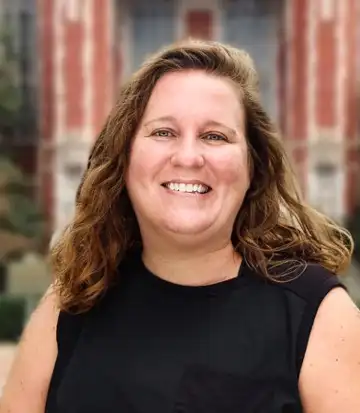From nature tv to pathogen hunter: Molly Simonis's journey in disease ecology
Meet Molly Simonis

As a current participant in the Intelligence Community (IC) Postdoctoral Fellowship, Molly Simonis researches the mechanisms of pathogen spillover from bats to humans, focusing on the influences of phylogenetic relatedness and social contact patterns on disease transmission. (Photo Credit: Molly Simonis)
In the captivating shows of PBS’s NOVA and Mutual of Omaha's Wild Kingdom, Molly Simonis, Ph.D., found more than just entertainment; she discovered her calling. Watching iconic figures like Steve Irwin and Jack Hanna sparked a deep curiosity about the natural world and the intricacies of wildlife. This initial fascination set her on a path of discovery, leading her to delve into the complex field of disease ecology.
Simon's educational journey began with a bachelor’s degree in environmental biology from the University of Dayton. During her undergraduate years, she realized the transformative potential of scientific research. Her experiences as a veterinary technician and a wildlife research fellow further fueled her passion for understanding animal health and infectious diseases.
Motivated by a desire to make a tangible impact, Simonis pursued a master’s degree in biological sciences and later a doctoral degree in environmental sciences from Wright State University. Her doctoral research on North American bats affected by white-nose syndrome deepened her interest in disease ecology. “Graduate school is where I really learned how much I enjoy research, asking questions, and in general, doing science for a career,” she shares.
Seizing the opportunity to expand her research, Simonis joined the Intelligence Community (IC) Postdoctoral Research Fellowship Program at the University of Oklahoma.
The IC Postdoctoral Research Fellowship was established in 2000 to support unclassified basic research in areas of interest to the IC. Funded primarily by the Office of the Director of National Intelligence (ODNI), the Program annually supports several Postdoctoral Fellows (Postdocs) from U.S. accredited colleges, universities, and U.S. Government laboratories across the country.
Under the mentorship of Assistant Professor Daniel Becker, Simonis embarked on an impactful research fellowship focused on pathogen spillover from bats to humans.
Throughout her fellowship, Simonis examined the complexities of zoonotic pathogen spillover, particularly how species relatedness and contact patterns influence infection dynamics. Her work involved developing epidemiological models to better understand how phylogenetic relatedness and social behaviors like co-roosting affect disease transmission. “The insights from my research are crucial for predicting and mitigating future spillover events,” Simonis explains.
Simonis's research revealed that even low rates of direct contact between species could lead to cross-species transmission, especially when multiple species share resources closely. This insight is vital for predicting and managing future outbreaks of diseases that originate in wildlife.
A typical day for Simonis involves a blend of laboratory and office work. She extracts and analyzes DNA and RNA from bat samples, performs pathogen diagnostics, codes and analyzes data, and writes manuscripts and grant proposals. This combination of empirical and theoretical work has expanded her skillset and prepared her for a future in academia. She aims to continue her career as an assistant professor, focusing on wildlife disease ecology, ecoimmunology, and physiology. “My goal is to continue working at the intersection of wildlife ecology and disease research, advocating for better health outcomes for both wildlife and humans,” she shares.
Simonis values the professional development opportunities and the supportive network provided by the IC Postdoctoral Fellowship. She has presented her research at various conferences, including Tech Week and the Ecological Society of America's Annual Meeting. With a publication in revision at Ecology and future papers planned, Simonis is set to contribute valuable knowledge to the field of disease ecology.
Looking ahead, Simonis remains steadfast in her commitment to advancing our understanding of wildlife health and disease dynamics. Her work underscores the importance of understanding wildlife health to prevent future pandemics.
As she embarks on the next chapter of her journey, Simonis's dedication to empowering individuals and communities through scientific research highlights the transformative potential of disease ecology in shaping a healthier future for all. In her continued pursuit of excellence, Simonis embodies the spirit of innovation and resilience that defines the field of public health.

